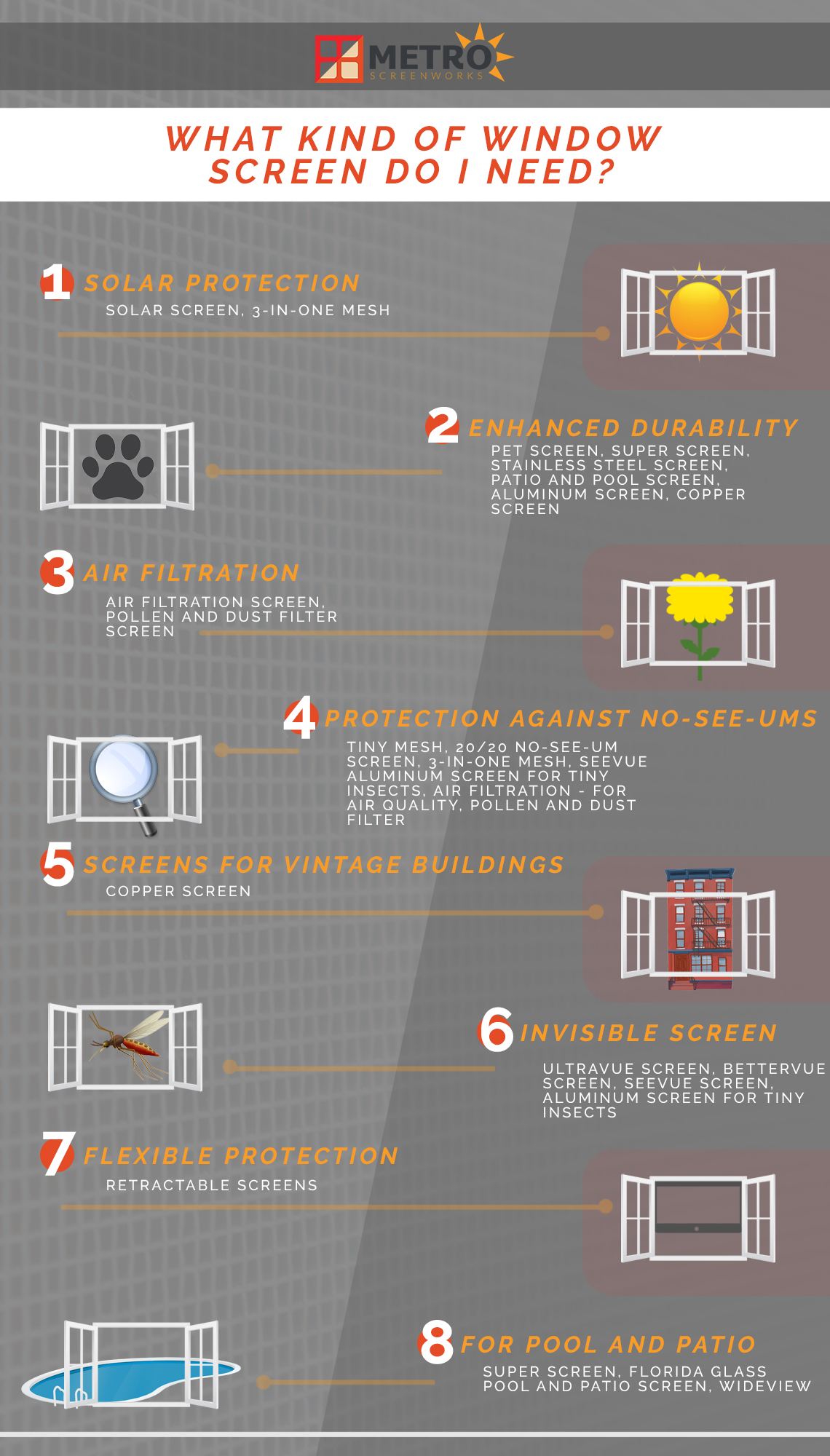 What do you want to know about your window screen? Find the answers to all of your questions here and learn about window screens. Learn more about measuring for new window screens and frequently asked questions about Metro Screenworks, and contact us for any other questions you may have.
What do you want to know about your window screen? Find the answers to all of your questions here and learn about window screens. Learn more about measuring for new window screens and frequently asked questions about Metro Screenworks, and contact us for any other questions you may have.
Quicklinks
What Are the Benefits of a Window Screen?
What Type of Window Screen Should I Use?
When Should I Replace My Window Screen?
How Do I Measure For a Window Screen?
Window screens keep pests out of your home and business while still allowing air flow when you open your windows. Window screens can also provide other benefits.
Window screens not only keep bugs and other pests from being a nuisance and keep those disease-carrying pests outside, but they also offer other benefits depending on the type of screen that you use. Specialty screens can provide:
- Enhanced durability
- UV protection
- Air filtration
- Improved outdoor view
- Vintage style
- Screen protection when you need it
Learn more about the possibilities!
The type of window screen you should choose depends on what you want it to do. All window screens are made to keep the bugs out. However, other types of window screens are manufactured to offer additional benefits:

Solar protection - solar screen, 3-in-one mesh
Enhanced durability - pet screen, super screen, stainless steel screen, patio and pool screen, aluminum screen, copper screen
Air filtration - air filtration screen, pollen and dust filter screen
Protection against no-see-ums - tiny mesh, 20/20 no-see-um screen, 3-in-one mesh, SeeVue, aluminum screen for tiny insects, air filtration - for air quality, pollen and dust filter
Screens for vintage buildings - copper screen
Invisible screen - UltraVue screen, BetterVue screen, SeeVue screen, aluminum screen for tiny insects
Flexible protection - retractable screens
For pool and patio - super screen, Florida glass, pool and patio screen, wideview
You should replace your window screen when there is a hole or tear that is large enough that you can not mend it. You should also consider replacing your window screen if it doesn’t fit tightly within your window frame and when it is no longer providing additional benefits.
Measuring for your new window screen is simple! Measure your old screen, first measuring the shortest side, then the longest side; you will want to measure to the closest 1/16 inch. Next, take note of the kind of hardware you need to install your screen and order your new screen. If you don’t have the original screen follow these instructions.
-
Step 1: Measure shortest side.
-
Step 2: Measure the longest side.
-
Step 3 Record measurements to the closest 1/16.
-
Step 4: Take note of hardware needed for installation.
-
Step 5: Order your new screen online from Metro Screenworks.

There are several standard sizes of windows that are made to fit in most modern homes.
-
2020 Standard Window Size — 24” x 24” or 2’ 2” x 2’ 2”
-
3838 Standard Window Size — 44”x 44” or 3’8” x 3’8”
Besides these two types of window sizes, there are a few other standard sizes that you might see. To determine the size of window screen you need to measure to the nearest 1/16 inch.

The longevity of your screen depends on a few factors: the type of screen you installed, wear and tear, sun exposure and more. However, generally, a window screen should last 10-15 years. With regular cleaning, a window screen can last an additional 5-10 years.
The cost of window screen replacement is based on the type of window screening material that you choose, as well as if you choose to install it or hire someone to do it. However, you can expect to spend anywhere from $50 and up to $100 or more on specialty screens. The cost will also be determined by your decision to buy pre-assembled screens, a window screen kit, or separate parts.







